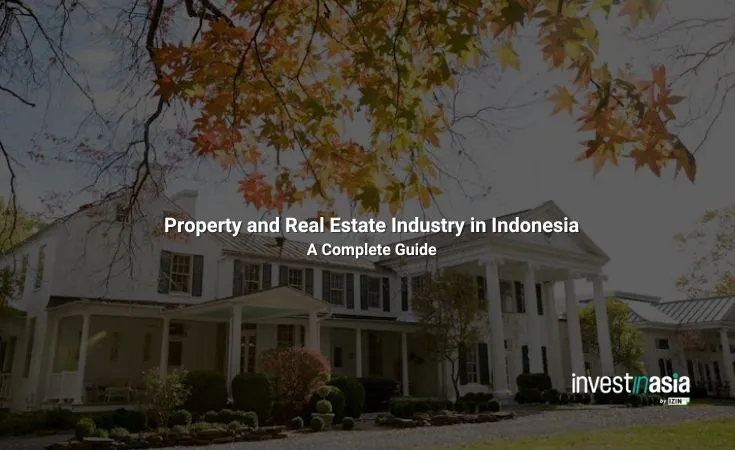Indonesia’s property and real estate industry is entering a golden era, driven by rapid urbanization, tourism growth, and massive infrastructure investment. From Jakarta’s bustling commercial hubs to Bali’s thriving villa market and emerging destinations like Lombok and Batam, opportunities stretch across residential, commercial, industrial, and hospitality sectors.
Yet, with strict property ownership rules and evolving regulations, investors, especially foreigners, must navigate a complex legal framework.
This guide explores Indonesia’s property market in detail, covering its size, key locations, ownership laws, growth drivers, challenges, and how foreign investors can establish a foothold in this booming sector.
Market Overview


Indonesia’s property and real estate industry is among the most dynamic in Southeast Asia. Valued at $66.74 billion in 2025, the sector contributes around 2.4% to the country’s GDP and is projected to expand steadily at over 5% CAGR. Rising urbanization, an expanding middle class, and government-backed infrastructure projects provide strong momentum for investors.
The industry covers residential, commercial, industrial, and hospitality properties, with strong demand across both local and foreign buyers. With tourism recovering, Bali and Lombok are seeing sharp price increases, while Jakarta and Surabaya remain economic centers for long-term rental and office demand.
Legal Framework and Foreign Ownership
Foreign property investment is governed by Government Regulation No. 103/2015, which prohibits direct freehold ownership. Instead, foreigners can access property through:
- Hak Pakai (Right to Use): An initial 30-year right, with possible extensions of up to 80 years in total.
- Hak Sewa (Right to Lease): Long-term leasing without ownership rights.
- Apartment Ownership: Permitted under specific regulations tied to Hak Pakai land.
Foreign buyers must meet criteria such as holding valid residence permits, having Rp. 2 billion in funds, and adhering to minimum property value requirements (e.g., IDR 5 billion for houses in Jakarta).
Also read: Recent Updates on Property Acquisition in Indonesia for Foreigners
Key Investment Locations


Jakarta
Jakarta, as Indonesia’s capital and financial center, presents excellent opportunities across residential, office, and commercial sectors. MRT expansion, new toll roads, and stable rental demand strengthen its outlook.
Also read: Can Foreigners Buy Property in Jakarta? (Complete Guide)
Bali
A tourism powerhouse, Bali attracts lifestyle and hospitality investors. Prices have risen over 50% in three years, with hotspots such as Berawa and Nusa Dua commanding premium rates.
Also read: Bali Property Market: Trends and Outlook
Surabaya
East Java’s commercial and industrial hub offers more affordable entry points, supported by robust manufacturing and logistics sectors.
Bandung
An innovation and education center with rising demand for mixed-use developments, boosted by the Jakarta–Bandung high-speed rail.
Emerging Markets
- Lombok – Supported by Mandalika projects and new airport.
- Batam – Industrial and logistics hub near Singapore, benefiting from free-trade incentives.
Industry Drivers and Challenges
Drivers:
- Strong demographics: young, urbanizing population
- Expanding infrastructure network
- Growing foreign investor interest
- Diverse property demand (residential, tourism, industrial)
Challenges:
- Complex regulatory environment
- Land rights restrictions for foreigners
- Fluctuating interest rates and mortgage accessibility
- Oversupply risk in certain commercial sectors
Future Outlook


By 2033, the country’s property market is expected to grow to $151.7 billion. Green building initiatives, smart city developments, and the relocation of the capital city to Nusantara will create new investment corridors. Proptech adoption is also accelerating efficiency in property transactions.
Steps for Foreigners to Establish a Property and Real Estate Business in Indonesia
Foreign investors seeking to operate in the property sector typically establish a PMA company (foreign-owned limited liability company). This entity enables engagement in property development, leasing, and management while remaining fully compliant with local laws.
Steps include:
- Establishing a legal entity (PMA company).
- Securing business licenses under the Online Single Submission (OSS) system.
- Meeting minimum capital requirements.
- Registering with BKPM (Indonesia Investment Coordinating Board).
This process ensures full compliance with Indonesian law and eligibility for long-term property operations.
For foreign investors, navigating Indonesia’s complex property regulations can be daunting. Setting up the right business entity is the foundation for long-term success. InvestinAsia’s Indonesia Company Registration Service simplifies the process with expert guidance, ensuring compliance, efficiency, and a faster entry into Indonesia’s lucrative real estate sector.
Chat with us now for FREE consultation!
FAQs
Can foreigners buy property in Indonesia?
Yes, but not freehold. They can acquire Hak Pakai, lease agreements, or apartments under specific conditions. Check the complete guide: Can Foreigners Buy Property in Indonesia? (Latest Update)
What are the most popular property markets?
Jakarta, Bali, Surabaya, Bandung, Lombok, and Batam.
What is the minimum investment value for foreigners?
In Jakarta, landed property requires a minimum investment of IDR 5 billion, with different thresholds set for other regions.
Is a company required for foreigners to invest in real estate?
Foreign investors who wish to own land directly are required to establish a PMA (foreign-owned limited liability company).
What drives Indonesia’s property growth?
Urbanization, infrastructure projects, tourism recovery, and rising middle-class demand.



